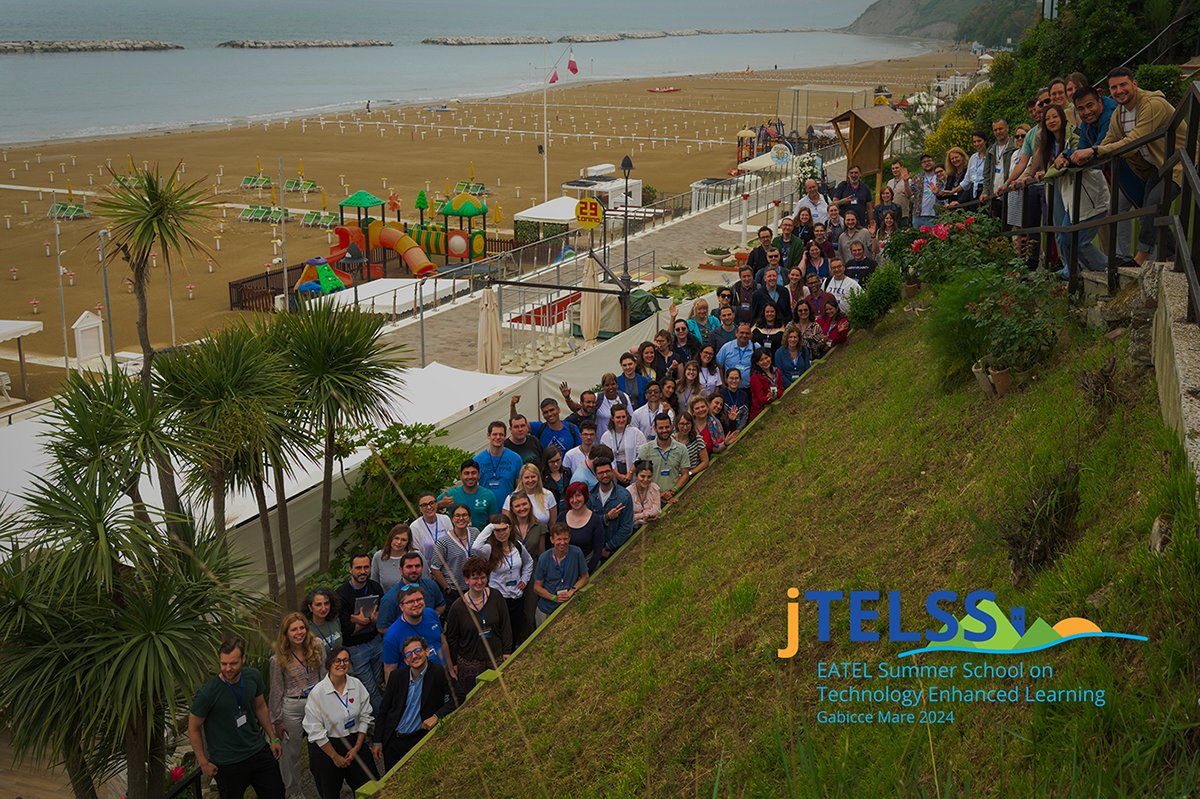In May 2024, the European Association of Technology Enhanced Learning's annual summer event, the JTEL summer school 2024, took place in Gabicce Mare, Italy. This year, I helped co-organize the summer school in Italy in collaboration with the Department of Computer Science of the University of Bologna, particularly with the help of Stefano Pio Zingaro and prof Maurizio Gabbrielli.
The event occurred at the Grand Hotel Michelacci in Gabicce. It was attended by over 100 participants at the JTEL summer school, of which more than 70% were PhD candidates in fields related to Technology-enhanced learning, and the rest were instructors or more advanced researchers.
I started going to the JTEL summer school in 2016 when I was just a master's student, and ever since, I have attended all the editions. JTELSS is not a simple academic event; is a relevant moment for community building for the TEL research community in Europe. Reaching its 17th edition, the JTEL summer school has helped generations of TEL PhD researchers escape the isolation they often face during their careers.
Like in previous years, the JTEL summer school provided a rich program that included thematic workshops, methodological workshops for PhD skills development, and interesting international keynotes. Through a Call for Sessions, the program is shaped bottom up, with the PhD candidates proposing workshops around their research or point of expertise. Compared to a classical academic conference, such as the connected mother EC-TEL conference, the JTEL summer school is more informal and certainly more fun. The objective is not only to let the participants present their research work but to spend time together, brainstorm, and develop collaborations and research ideas. This crowdsourcing of intelligence fuels research communities such as the ECTEL community.
I wish there were more events, such as the JTEL. The academia would be much more fun, social, and collaborative.
My contribution
Workshop: A Deep Dive into Multimodal Technologies for Skills Development
Multimodal Immersive Learning Systems for Skills Development workshop #mute4skid #jtelss24
with @rklemke @bibeglimbu @SuperHeroBooth @denizirenhttps://t.co/k80TKVxUYI pic.twitter.com/S6tMCkgMbX
— Daniele Di Mitri (@dimstudi0) May 13, 2024
Contribution by the PhDs I am supervising (Nina and Stefan)
Keynotes
Evening keynote by @sbuckshum "can TEL save the world?" was a wake up call for TEL researchers to step outside of their tunnelvision and start taking responsability for the world and for the multiple crisis that we are living #jtelss24 pic.twitter.com/HSRf3Whvyu
— Daniele Di Mitri (@dimstudi0) May 14, 2024
Kick-off of the @jtelss programme with first keynote prof @ChountaIrene talking on Intelligent Tutoring Systems and Adaptive Learning #jtelss24 #aied24 pic.twitter.com/EXetUCjenQ
— Daniele Di Mitri (@dimstudi0) May 13, 2024
Keynote by @fwild presenting the work of his Performance Augmentation Lab at @OpenUniversity on the topic of Embedding Learning with Augmented Reality#jtelss24 @jtelss pic.twitter.com/R5qO8It0M3
— Daniele Di Mitri (@dimstudi0) May 14, 2024
Last keynote of @jtelss is an energic @MutluCukurova who is decided to bring forward AI working is symbiosia with humans #jtelss24 pic.twitter.com/iasmHkRjtN
— Daniele Di Mitri (@dimstudi0) May 17, 2024
Cultivating Trust and Values in the Era of AI-Powered Education, keynote by @OlgaOvi at #JTELSS24 pic.twitter.com/p6GmxJbKT2
— Mikhail Fominykh (@MikhailFominykh) May 16, 2024
Excursions, Gala Dinner, Demo Session
Landed at the @eateleu #JTELSS24 summer school in Gabicce, Italy
Today the traditional Sunday's excursion at Gradara and boat tour to Pesaro pic.twitter.com/QBprrGjynp
— Daniele Di Mitri (@dimstudi0) May 12, 2024
Poster and demo session at @jtelss its full of cool research in technology enhanced learning #jtelss24 pic.twitter.com/zonCiCSX6L
— Daniele Di Mitri (@dimstudi0) May 16, 2024
Gala dinner of @jtelss summer school at the Club Nautico in Rimini celebrating the efforts of the volunteers which make this community great#jtelss24 pic.twitter.com/UifBGql7SM
— Daniele Di Mitri (@dimstudi0) May 15, 2024
Local research community panel at the @jtelss summer school at Campus Rimini of @Unibo
with speakers @BaccagliniAnna @dataibi
Maurizio Gabbrielli & @DanielaTafanidiscussing on improving the acceptance of education technologies and fostering interdisciplinarity
#jtelss24 pic.twitter.com/vnLpxrLdqx
— Daniele Di Mitri (@dimstudi0) May 15, 2024








